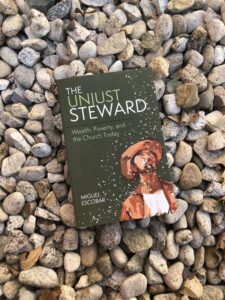Note: As we continue to pray for healing for the Rev. Canon Scott Gunn, this weekly message will feature guest writers from the Forward Movement staff and board of directors. Today’s message comes from Miguel Escobar, author of the book The Unjust Steward and Executive Director of Anglican Studies, Episcopal Divinity School at Union Theological Seminary.
One of the strongest memories I have from the worst days of the COVID-19 pandemic is of the long lines of people waiting for food, as well as the many news stories of pantries and soup kitchens being in short supply of both staples and volunteers. Hunger, already a pervasive problem in New York City, descended upon my city in ways that I never imagined I’d experience in my lifetime.
As I witnessed hunger overtake New York City, I found myself reflecting on the earliest historical reference to Christian communities taking up a collection in response to famine, an event described in Paul’s First Letter to the Corinthians, written around 50 CE. Frequently called “the Jerusalem collection,” it was a collection taken up for famine relief for the Christian community in Jerusalem.
 As early as 50 C.E., the energetic Paul was giving pragmatic instructions to the Corinthian community for a collection of monies to be sent to Jerusalem: “On the first day of every week, each of you is to put aside and save whatever extra you earn, so that collections need not be taken when I come. And when I arrive, I will send any whom you approve with letters to take your gift to Jerusalem. If it seems advisable that I should go also, they will accompany me” (1 Corinthians 16:1-4).
As early as 50 C.E., the energetic Paul was giving pragmatic instructions to the Corinthian community for a collection of monies to be sent to Jerusalem: “On the first day of every week, each of you is to put aside and save whatever extra you earn, so that collections need not be taken when I come. And when I arrive, I will send any whom you approve with letters to take your gift to Jerusalem. If it seems advisable that I should go also, they will accompany me” (1 Corinthians 16:1-4).
Monies would eventually be taken up in Galatia, Corinth, and Rome and would be physically brought to the Jerusalem assembly. Logistics were arranged (1 Corinthians 16:1-4), accusations of impropriety made, transparency ensured by having multiple people handling the funds (2 Corinthians 12:14-18), and protection against theft/robbery secured as the funds were brought to Jerusalem (Romans 15:25-29).
These practical details are intriguing in that they describe both the antecedents of current relief efforts as well as give a glimpse into the economic network of assemblies that characterized early Christianity. But what’s inspiring—and potentially transformative in our stewardship season today—is the theology behind how Paul discusses this collection.
In 2 Corinthians 8–9, Paul says that the joy and privilege of an assembly’s generous giving is ultimately rooted in God’s grace of becoming poor for our sake. We are to join in this divine journey as well. He states that even after Christ’s resurrection, the need for fair balance between those with great wealth and those in poverty, hunger, and destitution remains. This collection for famine relief is a way of addressing this imbalance.
Indeed, it is from a deeply rooted sense of bondedness and economic fellowship with one another (koinonia) that Christians have the grace and privilege (charis) of sharing our resources as an economic network and community, and our giving should be especially aimed at alleviating the poverty and hunger of the most vulnerable members of the body of Christ. Through our generosity, we join Jesus in becoming poor for the sake of our siblings in Christ who are suffering.
I believe this Jerusalem Collection should inform the way we think about all our collections, including the pledge cards taken up during stewardship season. Will your gift touch the lives of those who are in hunger? Are they reflective of what Paul described as “fair balance” between those who have much and those who have little? Does one’s gift honor an economic fellowship between those assemblies with much and those who are most vulnerable?
These are important questions to ask of the various stewardship campaigns that have taken place across the Church this fall. How might our stewardship campaign reflect this more so?
Yours faithfully,
Miguel Escobar
Author, The Unjust Steward
Executive Director of Anglican Studies, EDS at Union
More from our ministry:
Read more from Miguel Escobar in his book The Unjust Steward
Consider giving as a Vital Sign of Faith in Kate Moorehead Carroll’s new book
Explore scripture as a resource for action: The Social Justice Bible Challenge
Prepare for Advent with our annual calendar and newest book of meditations



